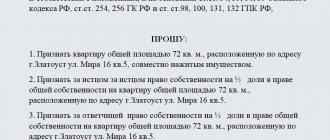What is a claim for ownership by acquisitive prescription and why is it needed? Such a claim is used to formalize ownership of real or movable property. And a method is used when others cannot be applied by force of law.
The most common methods of acquiring property rights: purchase and sale, inheritance, privatization, etc. But there is also a special institution - acquisitive prescription. The plaintiff in such claims is a special person. He owns the real estate and bears the burden of maintaining it. But legally the state does not recognize him as the owner.
A statement of claim for ownership by acquisitive prescription should be distinguished from a statement in special proceedings. We are talking about a claim based on prescription of possession. In the latter case, both legal costs and time to consider the case are significantly less than when resolving claims. But this method will not work when the previous owner of the item is known. Or other persons claim the property. After all, the court will determine that there is a dispute about the law. Then it will be useful to draw up a statement of claim for ownership by acquisitive prescription.
:
Statement of claim for ownership by acquisitive prescription
How to draw up a statement of claim for ownership by acquisitive prescription
The right to file a claim, i.e. to be a plaintiff belongs to the citizen (organization) who owns the property (his legal successor by virtue of law or will). The defendant will be the former owner or persons who claim their rights to the property (for example, heirs, spouse).
To recognize the right of ownership, it is necessary that the plaintiff has owned the property for at least 18 years (15 years + 3 years of limitation) - the requirement of Part 4 of Art. 234 Civil Code of the Russian Federation. For a movable - 8 years (5+3). Ownership must be:
- open. In all legal relations with other persons, the plaintiff must act as the owner. This circumstance can be confirmed by the fact of registration at the place of residence, witness testimony, payment for housing maintenance services, participation in a homeowners’ association.
- conscientious. The right of ownership of the property should have been acquired by the plaintiff under the terms of civil law, lawful actions. That is why, in order to register real estate built in violation of certain requirements, a claim for ownership of the unauthorized construction is filed in court.
- continuous. Property should not leave the owner's possession. This does not mean that it cannot be rented out. Can. This rule means that for the entire period of 18 years or more, the owner must not abandon the property, and his actions must be of a proprietary nature.
Tips on how not to lose your home
Long-term actual possession of residential premises makes a citizen think about the possibility of using it legally.
Especially if he invested a lot of effort and money into its maintenance. It is worth remembering that when living in someone else’s home you must:
- keep receipts, checks, contracts confirming repair work;
- pay utility bills and save receipts;
- do not interrupt the period of ownership of such property (do not leave it ownerless);
- do not hide the fact of home ownership.
Often, residential premises that citizens actually own for a long period of time are their only home. In this case, it is especially important to prove your bona fide ownership of such property.
Filing a claim in court
Claims for ownership by acquisitive prescription are proprietary. If documents are submitted to a court of general jurisdiction (more details - jurisdiction), the state duty depends on the cost of the claim. That is, property prices. It is not necessary to conduct an independent examination or assessment. The plaintiff can use the inventory estimate, the estimate from the insurance contract.
The place where the plaintiff will file the claim also depends on the value of the property. Less than 50,000? We submit the documents to the magistrate's court. More - to the district. And always at the location of the real estate. If about a movable thing - the location of the defendant.
If the defendant's place of residence is unknown, the plaintiff indicates the last known location. And sends the claim and all written evidence (which are included in the annex to the statement of claim) to the specified address in the name of the defendant.
If an interview with individuals or government officials is required to confirm the circumstances of the case, the plaintiff may submit a petition to the court simultaneously with the claim to call witnesses. You can obtain certificates from third parties if the court grants the request to obtain evidence.
A claim for ownership rights by acquisitive prescription is considered according to the general rules in a court hearing.
Arbitrage practice
Acquisitive prescription cases are quite complex to consider, which is why judicial practice on them is so diverse.
The most difficult issue that requires clarification and confirmation during the trial is bona fide ownership. The boundaries of good faith ownership are affected by the ruling of the Supreme Court of the Russian Federation dated September 17, 2019 No. 78-KG19-29. Often, trial courts regard possession as in bad faith if the plaintiff knew who owned the shares in the residential premises of which he owns part. However, higher courts usually have a different position, especially when the plaintiff, the shareholder, owns the entire apartment, and the owner of the disputed share does not show interest in it and does not bear the costs of its maintenance.
In addition, the Supreme Court notes the trial courts' misinterpretation of continuity of possession. When refusing to satisfy the claims, the courts refer to the fact that the plaintiff used the real estate periodically. However, ownership and use are not equivalent concepts. Therefore, if the plaintiff did not use the property for some time (did not reside temporarily), but took care of it and bore the burden of maintaining it, then possession of it does not cease (joint resolution of the Plenum of the Armed Forces of the Russian Federation and the Plenum of the Arbitration Court of the Russian Federation dated April 29, 2010 No. 10/22) .
Thus, when going to court, the plaintiff must be aware of the importance of the evidence base in the case and compliance with the conditions of acquisitive limitation.
To the Leninsky District Court of Omsk
Plaintiff: Auganova Sh. S., residing: Omsk, st. Cherlakskaya, house __
Defendant: Administration of Omsk, Omsk, st. Gagarina, 34
State duty to court: 600 rubles
Statement of claim for recognition of ownership of a residential building due to acquisitive prescription
In residential building No. __ (built in 1938) on the street. Cherlakskaya in Omsk, plaintiff Sh. S. Auganova, was registered on June 2, 1979, and has actually lived at the specified address since birth (since 1957).
“__” On January 1, 2006, the plaintiff’s mother, N. Niyazova, died, who before that date owned residential building No. __ on the street. Cherlakskaya in Omsk as if it were our own. Conscientious, open and continuous ownership of the disputed housing construction began on October 20, 1981, when Abahan Temerbaev, who considered himself the owner of ½ share in the right to this house, as well as all members of his family, left the house and were deregistered (attached are copies from house book). Currently, their place of residence or stay is unknown, their belongings are not in the disputed house, none of them have paid housing and communal services or taxes since leaving.
Temirbaev Abahan, in turn, treating the disputed homeownership as his own, based his status as a bona fide owner of a residential building on the fact that Imaganbetova Zlikha, who was the title owner of a ½ share in the homeownership at the address: Omsk, st. Cherlakskaya, __ based on the purchase agreement dated March 29, 1949.
According to available information, Imaganbetova Z. left ownership of the house in favor of Tamirbaev Abakhan, moving to another place of residence. Since she was not registered (registered) at the disputed place of residence, this fact is not reflected in the house register. Taking into account this circumstance, we believe that the plaintiff in such a situation is not deprived of the right to prove the fact of the owner’s refusal to own real estate by any other acceptable means of proof, including witness testimony.
Thus, after renouncing any rights to the disputed home ownership of Imaganbetova Zlikha, Temirbaeva Abakhana, the mother of the plaintiff, Niyazova N., became the owner of the house. The ownership was carried on openly, continuously and in good faith for 25 years until the day of her death.
After the death of her mother, the plaintiff has owned the disputed housing construction for more than 8 years.
As stated in Part 3 of Article 234 of the Civil Code of the Russian Federation, a person referring to the prescription of possession can add to the time of his possession the entire time during which this property was owned by the one whose legal successor this person is.
In accordance with the explanations given in the joint Resolution of the Plenums of the Armed Forces of the Russian Federation and the Supreme Arbitration Court of the Russian Federation No. 10/22 dated April 29, 2010, “there is no break in the prescription of possession even if the new owner of the property is a singular or universal legal successor of the previous owner (clause 3 Article 234 of the Civil Code of the Russian Federation).
The plaintiff Auganova Sh. S. is the universal legal successor of her mother Niyazova N., since she actually accepted the inheritance after her death (both the heir and the testator lived together and were registered at the place of residence in the disputed residential building).
Thus, the total period of ownership of the disputed home ownership is more than 33 years.
Within the period established by law, the plaintiff Auganova Sh. S. did not apply to the notary authorities to obtain a certificate of the right to inheritance. And given that the appropriate evidence of universal succession of ownership of the disputed home in this case may be a certificate of the right to inheritance, or a court decision establishing the fact of acceptance of the inheritance, we believe it is possible for the court to establish the fact of acceptance of the inheritance within the framework of this civil case.
In accordance with paragraph 3 of Art. 218 of the Civil Code of the Russian Federation, in cases and in the manner provided for by this Code, a person may acquire the right of ownership of property that does not have an owner, of property whose owner is unknown, or of property that the owner has refused or for which he has lost the right of ownership for other reasons. provided by law.
According to paragraph 1 of Art. 234 of the Civil Code of the Russian Federation, a citizen or legal entity that is not the owner of property, but who in good faith, openly and continuously owns either his own real estate for fifteen years or other property for five years, acquires the right of ownership of this property (acquisitive prescription).
Article 11 of the Federal Law “On the entry into force of part one of the Civil Code of the Russian Federation” dated November 30, 1994 N 52-FZ determines that the effect of Art. 234 of the Civil Code of the Russian Federation also applies to cases where ownership of property began before January 1, 1995 and continues at the time of the introduction of part one of the Civil Code of the Russian Federation.
From the meaning of the provisions of Art. 234 of the Civil Code of the Russian Federation it follows that the right of ownership of a real estate property by acquisitive prescription arises from a person under a combination of several conditions: this property has passed state registration, after which it acquired the status of an object of civil rights and obligations; this property has an owner (individual or legal entity), whose ownership is registered in the prescribed manner: the period of ownership of the person claiming the disputed object is at least 18 years from the date of state registration of the property (15 years according to the rules of Article 234 of the Civil Code of the Russian Federation and 3 years - the period during which the title owner of the property has the right to make a claim in the event that the object has left his possession against his will).
As stated in paragraph 15 of the joint resolution of the Plenum of the Armed Forces of the Russian Federation, the Plenum of the Supreme Arbitration Court of the Russian Federation, No. 10/22 of April 29, 2010 by virtue of paragraph 1 of Art. 234 of the Civil Code of the Russian Federation, a person - a citizen or a legal entity - who is not the owner of property, but who in good faith, openly and continuously owns either his own real estate for fifteen years or other property for five years, acquires the right of ownership of this property (acquisitive prescription) .
When resolving disputes related to the emergence of property rights due to acquisitive prescription, courts must take into account the following:
- possession by prescription is considered in good faith if the person, receiving possession, did not know and should not have known about the absence of a basis for the emergence of his ownership right;
- possession by prescription is recognized as open if the person does not hide the fact that the property is in his possession...;
- possession by prescription is recognized as continuous if it has not ceased during the entire period of acquisitive prescription...;
- ownership of property as one's own means ownership not by contract. For this reason, Art. 234 of the Civil Code of the Russian Federation is not applicable in cases where ownership of property is carried out on the basis of contractual obligations (rent, storage, gratuitous use, etc.).
In accordance with paragraph 16 of the above joint resolution of the Plenums No. 10/22, ownership by virtue of acquisitive prescription can be acquired for property owned by another person, as well as ownerless property.
In judicial practice (see, for example, the appeal ruling of the Kurgan Regional Court dated March 12, 2014 in case No. 33-722/2014), it is noted that possession by prescription is bona fide if the person receiving possession did not know and should not have know that there is no basis for the emergence of his property rights. Lack of such awareness may be based on two circumstances:
1) a bona fide acquirer considers himself an owner, having an imaginary basis for this, but in reality is not such, since the basis for the transfer of ownership was flawed (for example, in the case of acquiring a thing from an unauthorized alienator or from an authorized one, but with a flaw in the form of the agreement or without a state registration);
2) a bona fide purchaser realizes that he is not the owner, but does not know and cannot know the real owner (for example, in the case of taking possession of an ownerless thing).
Good faith, openness and continuity of ownership are established in the case where a person acquired the right on a flawed basis, and the title owner actually renounced the rights to real estate and the entire period of ownership the plaintiff believed himself to be the owner, without objectively being one (titleless ownership).
For example, C.A. sold the house to the plaintiff..., the money under the sale and purchase agreement was transferred to the son of Ch.A., which is confirmed by a receipt dated May 1993.
From the house register entry it follows that the Ch-nykh family left the disputed house in 1993. Since that time, the plaintiff has been living in the house, which is confirmed by his explanations, as well as the testimony of witnesses interrogated in the court of first instance.
From the receipts for payment for electricity and heating presented to the court, it follows that after purchasing the house, the plaintiff bore the costs of maintaining the house and paid taxes...
Thus, since 1993, the plaintiff has conscientiously, openly and continuously owned the said real estate as his own for more than fifteen years (see in more detail the appeal ruling of the Supreme Court of the Republic of Sakha (Yakutia) dated March 17, 2014 in case No. 33-820/14)
In another case, recognizing the plaintiff’s right of ownership by acquisitive prescription, the court stated the following.
..At the court hearing, it was established that at the time of transfer of the disputed house to the plaintiff, it was indeed in the ownership of K., however, she did not live in the house, until the moment of death there were any actions indicating that the property was taken out of possession against her will, did not undertake. According to the documents presented in the case materials, Z., acting as a seller, actually lived in this house, sold the house to the plaintiff and received the agreed price by drawing up a receipt.
Thus, at the time of transfer of the disputed object into the possession of the plaintiff and payment of funds, there were no grounds to assume the illegality of the alienation. As follows from the case materials, after the transfer of property to the plaintiff, neither K. nor her heirs after the death of K., who died in 1990, made any claims in relation to the disputed homeownership. Under these circumstances, the court’s conclusions that the plaintiff’s possession of the disputed house is in bad faith contradict the established facts (see for more details the ruling of the Perm Regional Court dated September 23, 2013 in case No. 33-8843/2013)
Since 1981, Niyazova N., and subsequently, after her death, plaintiff Auganova Sh. S. own a residential building on the street. Cherlakskaya, __ in Omsk in good faith, openly and continuously, treating the specified real estate as their own: they pay for housing and communal services, property tax, land tax. At the same time, during the entire period of ownership of the specified house, no one claimed my right of ownership for prescription - did not challenge it. From the moment Zlikha Imaganbetova, Abakhan Temirbaev left the household, their relatives were not announced; moreover, the plaintiff knew nothing about their place of residence throughout the entire period of ownership of the house, as it is still unknown today. They did not declare their rights to the house and authorities.
Taking into account that the right of ownership in accordance with Article 234 of the Civil Code of the Russian Federation cannot be recognized for an unauthorized construction, the plaintiff asks to recognize the right to a property that is not an unauthorized construction. In particular, as of 1938 (the year the disputed house was built), letter A, as follows from the technical passport of the household, compiled by the State Institution "TsTI Omsk Region", is not an unauthorized construction; in 1943 and in 1949 it was the subject of valid transactions for the transfer of ownership.
Taking into account the above, for the purpose of determining the amount of the state duty, the plaintiff is guided by information about the actual value of the disputed residential building (main structure - letter A) contained in the above-mentioned technical passport of the home ownership (actual value - 1566 rubles). The state duty will be 400 rubles (as well as 200 rubles for consideration of the request to establish the fact).
In accordance with paragraph. 2 tbsp. 12 of the Civil Code of the Russian Federation, the protection of civil rights is carried out, inter alia, through the recognition of rights.
Based on the above and in accordance with paragraph. 2 tbsp. 12, paragraph 3, art. 218, paragraph 1, art. 234 of the Civil Code of the Russian Federation, guided by Art. Art. 131 - 132 of the Civil Procedure Code of the Russian Federation,
ASK:
1. To establish the fact that Sh. S. Auganova accepted the inheritance that opened after the death of N. Niyazova;
2. Recognize the ownership of Sh. S. Auganova for ½ share in the right to the property - a residential building (letter A), built in 1938, located at the address: Omsk, st. Cherlakskaya, house No. __, due to acquisitive prescription.
Application:
1. Copies of the statement of claim by number of parties * ; 2. A copy of the technical passport of the household, compiled by the State Institution “TsTI Omsk Region”, issued on October 28, 2004; 3. A copy of extracts from the house register “for registration of citizens living in house No. __ on the street. Cherlakskaya” 4. Copy of Sh. S. Auganova’s passport; 5. Copy of Niyazova N.’s passport; 5. A copy of the death certificate of Niyazova N. dated January 10, 2006; 6. A copy of marriage certificate No. 20 (about changing the plaintiff’s surname); 7. A copy of the veteran’s certificate, a copy of the pension certificate, a copy of N. Niyazova’s insurance certificate (on one sheet); 8. copies of receipts for payment of utilities (electricity) by Sh.S. Auganova. for the period 2006-2007 (on 8 sheets); 9. copy of Niyazova N.’s will (in favor of Sh. S. Auganova); 10. copy of the receipt for receipt of payments for state compulsory insurance dated May 12, 1993; a copy of the receipt for payment of electricity addressed to Auganova dated 08/10/1993; a copy of the tax notice addressed to Niyazova dated 09/06/1982 (on one sheet); 11. copy of the receipt for payment of tax on buildings addressed to Auganova dated 08/20/1990; 12. copies of receipts for payment of property tax for individuals, land tax, requirements for payment of tax for the period from 2008 to 2013 (on 14 sheets); 13. receipt for payment of state duty to the court.
Attorney-in-fact ______
- See also in this case: absentee decision of the Leninsky District Court dated October 23, 2013 on the recognition of ownership of a residential building by acquisitive prescription
* From October 1, 2019, the plaintiff must independently send the statement of claim and its attachments to the participants in the process
Until October 1, 2021, the plaintiff sent to the court copies of the statement of claim and appendices to it according to the number of defendants and third parties, and the court sent the received documents to all participants in the process named in the claim.
From October 1, the plaintiff must independently send to other participants in the process a copy of the claim and other documents attached to the claim, and provide confirmation of their sending to the court (clause 6 of Article 132 of the Code of Civil Procedure of the Russian Federation).
In paragraph 1 of the appendix to the above statement of claim, reference should be made to “a notice of delivery or other documents confirming the sending to the defendant of copies of the statement of claim and the documents attached to it, which he does not have.”
recommend other examples of claims on the topic:
Statement of claim for recognition of ownership rights by virtue of acquisitive prescription for 1/2 share in the right to a residential building
Statement of claim for recognition of ownership rights by virtue of acquisitive prescription for 2/5 shares in the ownership of home ownership
Other claims in the section statements of claim for recognition of the right to real estate, allocation of a share, claim, registration
All documents to the court (procedural documents):
Statements of claim to court; Applications to court (public legal relations, special proceedings..); Petitions to court, statements; Objections (response) to the statement of claim, complaint, arguments to the court; Complaints to the court (appeal, cassation, supervisory, private); Complaints against a decision in a case of an administrative offense; Complaints to the prosecutor's office and other authorities; Complaints, statements, petitions in criminal proceedings; Other procedural documents; Pre-trial claims (samples), demands, responses to claims.








